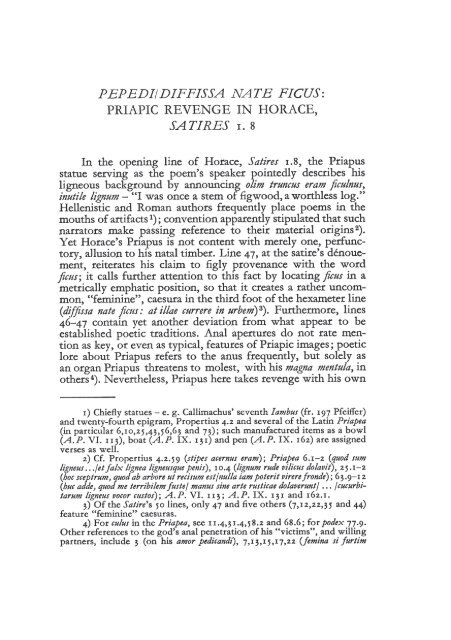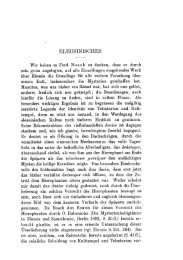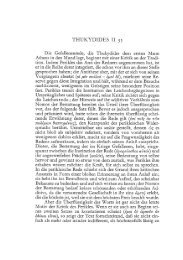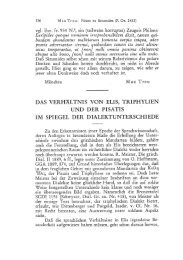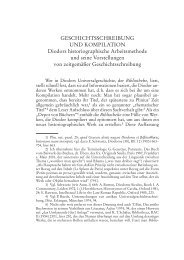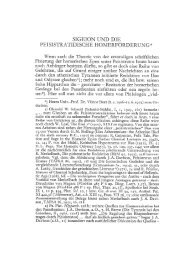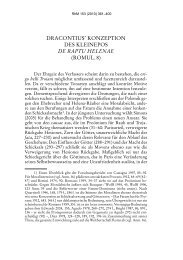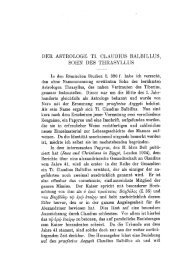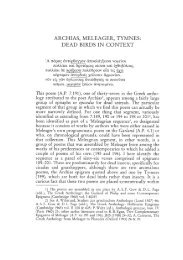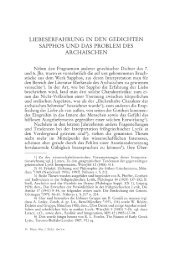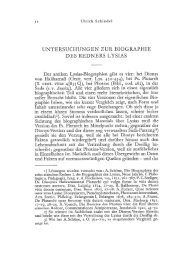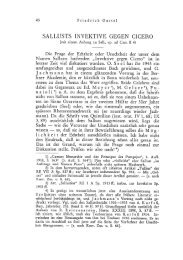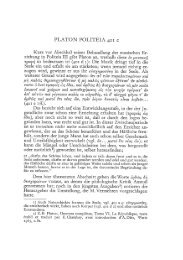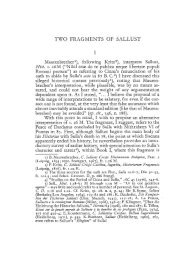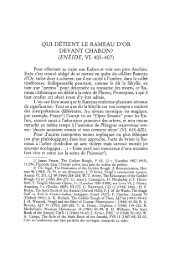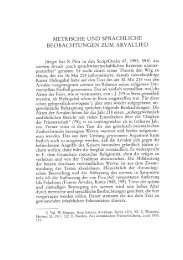PEPEDIIDIFFISSA NATE FICUS: PRIAPIC REVENGE IN HORACE ...
PEPEDIIDIFFISSA NATE FICUS: PRIAPIC REVENGE IN HORACE ...
PEPEDIIDIFFISSA NATE FICUS: PRIAPIC REVENGE IN HORACE ...
Create successful ePaper yourself
Turn your PDF publications into a flip-book with our unique Google optimized e-Paper software.
<strong>PEPEDIIDIFFISSA</strong> <strong>NATE</strong> <strong>FICUS</strong>:<br />
<strong>PRIAPIC</strong> <strong>REVENGE</strong> <strong>IN</strong> <strong>HORACE</strong>,<br />
SATIRES 1. 8<br />
In the opening line of Horace, Satires 1.8, the Priapus<br />
statue serving as the poem's speaker pointedly describes his<br />
ligneous background by announcing olim truncus eram fieu/nus,<br />
inutile lignum - "I was once a stem of figwood, a worthless log."<br />
Hellenistic and Roman authors frequently place poems in the<br />
mouths ofartifacts 1 ); convention apparently stipulated that such<br />
narrators make passing reference to their material origins 2 ).<br />
Yet Horace's Priapus is not content with merely one, perfunctory,<br />
allusion to his natal timber. Line 47, at the satire's denouement,<br />
rdterates his claim to figly provenance with the word<br />
ficus; it calls further attention to trus fact by locating ficus in a<br />
metrically emphatic position, so that it creates a rather uncommon,<br />
"feminine", caesura in the third foot of the hexameter line<br />
(diffissa nate ficus: at iIIae currere in urbem)3). Furthermore, lines<br />
46-47 contain yet another deviation from what appear to be<br />
established poetic traditions. Anal apertures do not rate mention<br />
as key, or even as typical, features of Priapic images; poetic<br />
lore about Priapus refers to the anus frequently, but solely as<br />
an organ Priapus threatens to molest, with his magna mentu/a, in<br />
others 4 ). Nevertheless, Priapus here takes revenge with his own<br />
I) Chief'ly statues - e. g. Callimachus' seventh Iambus (fr. 197 Pfeiffer)<br />
and twenty-fourth epigram, Propertius 4.2 and several of the Latin Priapea<br />
(in particular 6,10,25.43,56,63 and 73); such manufactured items as a bowl<br />
(A.P. VI. 113), boat (A.P. IX. 131) and pen (A.P. IX. 162) are assigned<br />
verses as weil.<br />
2) Cf. Propertius 4.2.59 (stipes acernus eram); Priapea 6.1-2 (quod stlm<br />
Iigneus ...Jet falx lignea ligneusque penis), 10.4 (Iignum rude vilicus dolavit), 25.1-2<br />
(hoc sceptrum, quod ab arbore ut recisum estJllulla iam poterit virerefronde); 63.9-12<br />
(huc adde, quod me terribilem fusteJ manus sine arte rusticae dolaveruntJ ... Jcucurbitarum<br />
ligneus vocor custos); A.P. VI. 113; A.P. IX. 13I and 162.1.<br />
3) Of the Satire's 50 lines, only 47 and nve others (7,12,22,35 and 44)<br />
feature "feminine" caesuras.<br />
4) For culus in the Priapea, see 11.4,31.4,58.2 and 68.6; forpodex 77.9.<br />
Other references to the god's anal penetration of his "victims", and willing<br />
partners, include 3 (on his amor pedicandi), 7,13,15,17,22 (femina si furtim
J udith P. Hallett<br />
anus, frightening the troublesome and meddlesome witches<br />
Canidia and Sagana with explosive wind- breaking (pepedi/difjissa<br />
nate).<br />
Few discussions of Satire! 1.8 have attempted to account<br />
for these two literary anomalies. Most studies generally offer<br />
literal explanations of lines 46-47 - citing the tendency oE figwood<br />
to split in the sunshine, even speculating that the sight of<br />
an actual Priapus statue "with an oddly warped posterio:r" in<br />
Maecenas' gardens inspired Horace to write the poem5). One<br />
recent critic assumes Priapus to break wind accidentally, because<br />
the witches have terrorized him into "losing control of<br />
hirnself" ; this article maintains that Horace here presents a<br />
Priapus who is uncharaeteristically fearful in order to reverse<br />
literary convention and "illustrate the surprising power of<br />
laughter"6). But nothing in the poem suggests that Priapus<br />
everfears the witches; ut non testis inultus in 44 would even imply<br />
that Priapus emits his anal explosion intentionally7). What is<br />
more, this, Horatian, Priapus achieves the same results from<br />
anal exertions - rouring those who trespass against hirn - that<br />
the god portrayed in the poems of the Corpus Priapeorum hopes<br />
to obtain with his phallus, after injuring the anuses of trespassers.<br />
Horace may reverse literary convention in Satires 1.8, but<br />
in his choke of the anus as Priapus' vengeful organ rather than<br />
in his charaeterization of Priapus hirnself.<br />
Yet literary evidence, chiefly from Priapean poetry, may<br />
help us to understand why, at the climax of this satire, Horace's<br />
/a&iet mihi virve puerve/ hau &unnum, &aput hi& praebeat, ille nates), 25, 28,35,38,<br />
41,51,59,67,69,71,74,76; 25,4°,48 and 73 all concernpathi&ae pueflae.<br />
5) See most recently N.Rudd, The Satires 0/ Hora&e (Cambridge 1966)<br />
70-72, who follows both P.LeJay in his commentary on Horace's Satires<br />
(Paris 1911) 229 and A. Kiessling - R.Heinze in theirs (Berlin 1957) 1;7<br />
when underlining the fissibility of figwood. See also E.Fraenkel, Hora&e<br />
(Oxford 1957) 123. Both Kiessling-Heinze (p. 143) and W.Schetter, Antike<br />
und Abendland 17 (1971) 158 view the second reference to figwood as<br />
merely a conscious echo of the first.<br />
6) W.S.Anderson, AlP 93 (1972) 6-7,8,11,13.<br />
7) At line 18 Priapus refers to the witches as a mrde... atque labori, and<br />
at 45 he claims that they made hirn shudder (horruerim), but he never owns<br />
up to being intimidated by thern. We should also note that Greek cornic<br />
literature portrays the anal response to terror not as farting, but as diarrhea,<br />
totalloss of bowel contro!. Cf. Dionysus' conduct at 308 of Aristophanes'<br />
Frogs; cf. also the observations on this play by G. Wills, Hermes 97 (1969)<br />
313 ff., who contends that &repitus ventris functions as a form of combattive<br />
self-assertion at lines 2;7ff.
Pepedifdiffissa nate ficus: Priapic revenge in Horace, Satires 1.8 343<br />
Priapus alludes - with the word ficus - to his figwood form a<br />
second time and resorts, ironkally, to anal vengeance. From<br />
examining the use not only of the Latin term ficus itself, but also<br />
that of its related adjeetive ficosus and even the collective noun<br />
ficetum, it seems dear that it is a "loaded word", dosely connected<br />
with the portrayal of the anus, and particularly the anus injured<br />
as a result of retaliatory penile penetration. That ficus possesses<br />
"anal" connotations appears certain from the testimony of<br />
various Latin medical writers, who employ both the Greek<br />
word avxwau;, "fig growth", and ficus for excrescences arising<br />
on that part of the anatomy8). Both Martial 1.65 and 14.86 and<br />
a Pompeian inscription (C.I.L. IV. 1820) also employ ficus in<br />
contexts which suggest that the term must have designated<br />
"piles" or anal ulcerations, although without specifying that<br />
such physical deformities result from anal intercourse 9 ). But<br />
two of the Priapea, 51 and 69, each of which technically utilizes<br />
ficus in its literal sense of "fig tree" or "fig fruit", describe<br />
Priapus as promising to retaliate against those who stealfici from<br />
his garden by penetrating them anallylO); they therefore link the<br />
word, albeit tenuously, with vindictive punishment per anum.<br />
Martial 6.49, spoken by a cypress-wood Priapusstatue, represents<br />
the phallus-proud god predicting that a ficus will<br />
spring up, grafted a cupressu, on whoever wrongs him; as a<br />
8) Celsus 6+1, Placitus, Med. 11.7; Marcellus, Med. 31.16 (coyly,<br />
with ficos qui nascuntur in locis verecundioribus); Dioscurides 1.32. Cassius Felix<br />
uses alm/iJT1X61; to describe a medication for anal hemorrhoids. The ancients'<br />
view of"piles" as "swellings to be excised" is also reflected at Juvenal 2.12;<br />
he refers to them with another word for fig, marisca, and attributes them<br />
to passive involvement in anal sex (as do other Latin authors, see below,<br />
notes II,15 and 16). An association between the fig and the anus appears<br />
in a gloss by Hesychius - almt
Pepedifdiffissa nate ficus: Priapic revenge in Horace, Satires 1.8 345<br />
eally penettated anus, and not neeessarily that which has been<br />
somehow punitive1y injured. Martial seemingly applies the word,<br />
literally meaning "fig orehard", at 12.33.2 to boys purehased by<br />
Labienus for anal sexual aetivity I7).<br />
We may thus with good reason eonclude that to a Roman<br />
audienee the wordficus would have had unmistakable associations<br />
with the anus, especially the anus deformed through penile<br />
penetration; Horaee's readers would have equally good grounds<br />
for eonneeting ficus with the anus slated for disfigurement in an<br />
aet of revenge by the phallie, and invariably menacing, god<br />
Priapus 18). Finally, other evidenee from "Priapie" eult would<br />
attest to a formal link between the god, particularly his phallus,<br />
and the vengefully and/or injuriously penetrated anus: the anuslike<br />
aperture ereated in the clenehed-first, "phallie", sign of the<br />
ficus, whieh is frequently represented on southem Italian amulets<br />
re1ated to Priapic worship, and whieh served to insult males I9 );<br />
the porttayal at Pettonius, Saryricon 138 of painful anal penetration<br />
with a fascinum as a ritual eure for impotenee vindietive1y<br />
17) Vt pueros emeret lAbienusvmdidit hortosf nil nisi fiettum nunc lAbienus<br />
habet.<br />
18) I accept the thesis of H.Herter, De Priapo. ReJigionsgeschichtliche<br />
Versuche und Vorarbeiten 23 (1932) 28 that Roman authors had begun to<br />
write "Priapean poetry" by the time of Catullus; indeed, I find Nonius<br />
Marcellus' statement (I H M) CatulJus Priapeo de meo Jigurrire libido est<br />
compelling evidence that Catullus himself tried his hand at such vorses.<br />
Although the extant collection of Priapea doubtless postdates Horace's<br />
Satires - as does our other, largely Priapean, testimony on the anal connotations<br />
officus, Horace must have had a Priapean poetic tradition on which<br />
to draw; his use of punning word play, a notable characteristic of Priapean<br />
poetry, in this satire (on which, see below, especially n. 21) mayaIso imply<br />
as much. I do not think, however, that the Latin word ficus itself - as opposed<br />
to marisca and the Greek word umeov (on which see Buchheit [above,<br />
n. 8] 201 ff.) - would have also connoted, to a Roman audience, the male<br />
or female genitals; neither the article s. v. ficus in the Thesaurus Linguae<br />
lAtinae, Vol. 6.1 (Leipzig 1912-1926) colls. 650-654, nor Buchheit provide<br />
any examples officus in such asense.<br />
19) See R.Payne Knight, An Account 0/ the Remains 0/ the Worship 0/<br />
Priapus, lately existing at Isernia, in the Kingdom 0/ Naplesf A Discourse on<br />
the Worship 0/ Priapus (London 1886) 4,28,148ff. (especially 149-151 "the<br />
thumb forming a phallus"). Payne Knight theorizes - on the basis of modern<br />
associations between the fig and a "woman's quaint", and the fact<br />
that woman wore these amulets as insurance against barrenness - that the<br />
aperture signified the vagina. Such an explanation does not, however,<br />
account for the use of the ficus-sign as an insulting gesture to males, as<br />
would the view that the aperture could symbolize both vagina and (male)<br />
anus, depending on the sex of the addressee.
Judith P. Hallett<br />
visited by Priapus; the suggestion of Priapea 25 that the god's<br />
membrum received worshipful adoration from anal pathics 20).<br />
These facts strongly suggest that Horace's otherwise gratuitous<br />
deployment officus - a word elsewhere associated with the anus,<br />
and vengeful punishment, and Priapus - in a poem about Priapus,<br />
at the point where he delineates the god's revenge, and<br />
anally-achieved revenge at that, is no coincidence, but rather a<br />
conscious, literarily-motivated decision.<br />
Nevertheless, the reversed role assigned the anus in this<br />
Priapean poem - that of active rather than passive organ, of<br />
victimizer rather than victim - still requires some justification.<br />
This difficulty, however, is easily amenable to a literary explanation<br />
as weH, inded one to be found in Priapean poetic conversion.<br />
For, like Satires 1.8, where Priapus uses a most un<br />
Priapean form of vengeance (as weH as a word connected with<br />
revenge obtained not by, but on, the anus when portraying<br />
this vengeance), various Priapea also conclude by having the god<br />
depict his behavior, or condition, as somehow unexpected and<br />
perverse in its nature, and do so through amusing double-entendres<br />
on sexuaHy-charged, anatomicaHy-related terms. Consider 15.7,<br />
with its play on the two meanings - testicles and witnesses <br />
of testibus. 7 and 55 are more apposite illustrations, inasmuch as<br />
the punning words here (7.2 blaesa lingua and 55.6 Gallus, aHuding<br />
to an amputated mentula) refer, like ficus, to organs and/cr Ofganic<br />
peculiarities which Priapus-figures are not ordinarily<br />
thought to possess. Furthermore, Horace seems to have composed<br />
this poem's next-door neighbor, Satires 1.7, solely to indulge<br />
in a similar jeu de mots on Rex at 33-35 21 ). One might<br />
2.0) Cf. 3, quod palhicae pelunl puellae and 5, cui danl oscula nobiles cinaedi;<br />
on the basis of this poem and assorted other data, Herter (above, n. 18) 2.2.7<br />
concludes that Priapus was the palronus mollium el effeminalorum.<br />
2.1) Cf. also the deployment of two anally-associated, ironie and punning<br />
expressions earlier in Salires 1.8. At 37-39 Priapus swears that if he<br />
is telling a He he will gladly suffer befoulment, and thereby endure having<br />
the tables turned on hirn, by anal products: the merdis ..albis corvorum on<br />
his head (crows being birds Priapus customarily scares away) and the visit<br />
oft Juliuulfragilis Pedalia furque Voranus ..in me cacalum (thieves, and other<br />
unwelcome guests, are of course habitually vietimized by Priapus). LeJay<br />
(above, n. 5) 2.2.8 remarks that, according to schoHasts, the feminine name<br />
Pedatia gibes at the anal pathic behavior ofa certain Pedatius. The similarity<br />
between its three letters and those of two anally-connected words, pedicare<br />
and pedere, to fart, also deserves our attention: plays on both of these words<br />
are found elsewhere in Latin literature - pedicare at Priapea 58, pedere at<br />
Martial 4.87. Teslis in line 44 appears to function as a "Priapean", though
Pepedifdiffissa nate ficus: Priapic revenge in Horace, Satires 1.8 347<br />
eonsequently even impute Horaee with here insetting fiCUS to the<br />
same end, as it were. Perhaps he afsigned his Priapus an anal<br />
form of revenge in this poem beeause ficus, the Latin word for<br />
the stahle's eonstituent material, also eonnoted anal irregularities<br />
of a sott whieh this very god was renowned for vindictively<br />
eausing. Perhaps he wanted the anus for onee to have its revenge,<br />
by serving, in lieu of the phallus, as Priapus' justly<br />
vengeful implement22).<br />
Boston University Judith P. Hallett<br />
wholly "genital" pun as weil; with it Horace has the god remind us of his<br />
capadty for more "traditional" Priapean revenge through an allusion to<br />
his formidable inguinal endowments.<br />
22) I should like to thank Mr. Alan Griffiths, Dr. Mark Hallett, Prof.<br />
Dr. Hans Herter, Dr. Nicholas Horsfall and Mr. Peter Howell for their<br />
valuable assistance on this paper.


